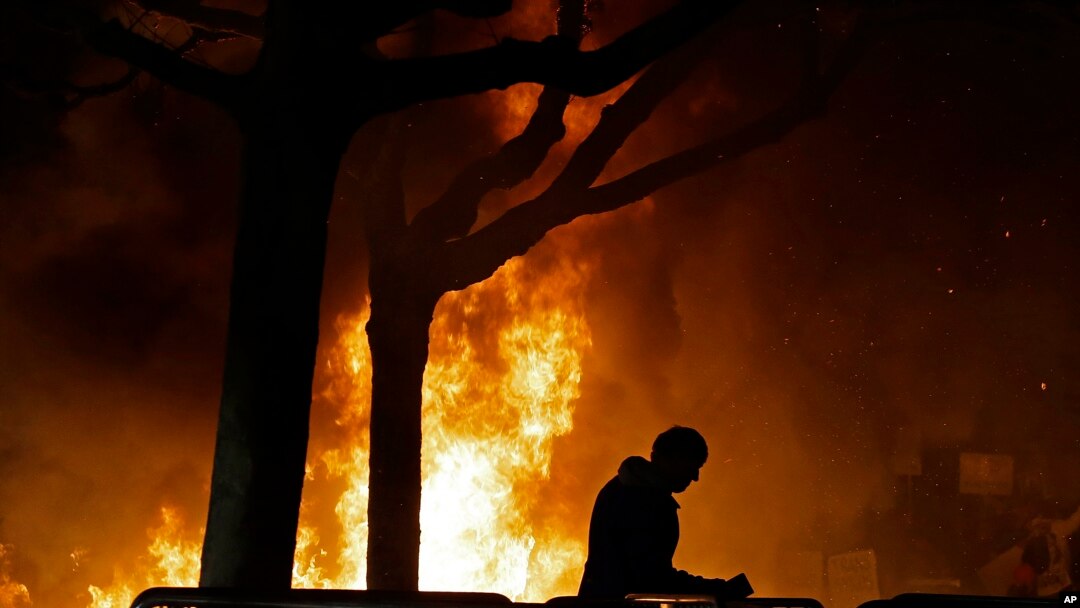As violence unfolded near the University of Virginia-Charlottesville recently, international students about to start school in the U.S. asked themselves: “What just happened?”
Devesh Sahai, a junior in economics and foreign affairs at the University of Virginia-Charlottesville (UVA), was in India when Charlottesville dissolved into violence. He said he has never felt threatened by white supremacy and has not faced discrimination since he joined UVA in fall 2015.
But the events in a park near campus made him “a lot more cautious” when he returned this fall.
“On several occasions, I have had to deal with ignorance towards my cultural background, but at no point have I found this ignorance malicious,” said Sahai.
Among the uninformed questions about his ethnicity?
“What part of India is Dubai in?” or “Do you speak Indian?” Sahai explained. (Answer: Dubai is a city in the United Arab Emirates along the Persian Gulf. And, most of India speaks English because the British colonized the country for nearly 200 years.)
UVA hired Virginia firm MSA Security to assess safety-risks for large campus events, and it has increased campus police on UVA grounds, among other safety measures, according to University of Virginia President Teresa A. Sullivan on Thursday.
“Such events obviously make you consider the limitations of freedom of expression,” Sahai said. “While an integral tenet of democracy, freedom of expression needs to have boundaries … freedom of expression needs to be curtailed the moment it turns violent.”
Ali Muhsen, an environmental systems engineering senior at the Pennsylvania State University in State College from Kuwait, has weighed freedom of expression on college campuses. He says he is against it becoming a platform for “hate,” or “supremacy.”
“Giving a stage and an audience to someone who will encourage and spread hatred is not something I’d ever encourage,” wrote Muhsen to VOA Student Union.
At UC-Berkeley, 132 faculty members are pondering the same issues.
The faculty members have written to the campus community and called for a boycott of classes and campus activities during “Free Speech Week” September 24-27. The Berkeley Patriot, a conservative student group, said it had invited conservative personalities Milo Yiannopoulos, Steve Bannon and Ann Coulter to speak.
“As faculty, we cannot ask students and staff to choose between risking their physical and mental safety in order to attend class or come to work in an environment of harassment, intimidation, violence and militarized policing,” the faculty letter stated.
But this week, Bannon and Coulter said they would not be at the event because of "logistical issues," the Daily Californian reported.
Muhsen moved to the United States to study for an undergraduate degree in engineering in fall 2012, he said. He is part of the Kuwaiti Student Association on campus and is managing public relations for his club this semester.
Like Sahai, Muhsen said he has not faced discrimination in the United States, except when someone used a “racial slur” against him at a pit stop enroute to another city, he recalled.
White supremacy “doesn’t frighten me because I have hope that the world will not allow for such a thing to continue and grow stronger,” Muhsen wrote to VOA StudentU.
Neither does it frighten Jack Liu, an agribusiness management junior at the Michigan State University, who said he sometimes feels unsafe on campus because of the “unpredictable” nature of colleges campuses across the United States.
“It's like we never know what is going to happen in next second no matter where you are.”
Liu who is from Zhengzhou, China, moved to the United States for college in fall 2015.
While Sahai, Muhsen and Liu say they don’t worry about white supremacy, its presence continues to grow on college campuses, according to the Anti-Defamation League.
Since September 2016, 188 instances of white supremacist propaganda have been identified on 126 college campuses in 39 states, it said in a press release.
Liu hopes that incidences of violence such as Charlottesville never occur at MSU or any other campus in the future.
“It was terrible what happened,” he wrote to VOA StudentU, “and it made students want to hide in fear or be afraid.”
Please leave a comment here, and visit us on Facebook, Twitter, Instagram and LinkedIn, thanks!


